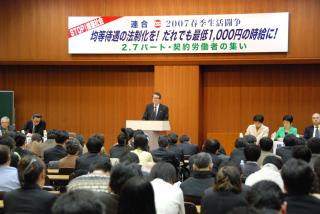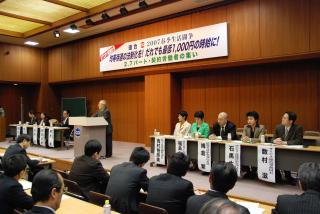HOMEUpdates
Updates
RENGO News
“Shunto 2007 : Part Time and Contracted Workers Forum”
08 February 2007
RENGO President Takagi made the first speech and mentioned the trend in the USA towards large increases in the minimum wage. He stressed that, even from an international point of view, it was about time that Japan also improved the minimum wage and overtime and holiday pay rates. “I would like the issue of improved treatment of part-time workers to be included in negotiations with management in any workplace with part-time workers,” Takagi said. “It is not fair for trade unions to negotiate only on behalf of permanent employees and it is unforgivable to pretend not to see that some workers are working under much worse conditions. We must use all our strength to close the widening wealth gap in society and correct one of its causes, discrepancies in employment status.”
Yoji Tatsui, Executive Director of RENGO’s Human Rights and Equality Department reported on deliberations in the govermental Equal Employment Sub-Committee on reforms to the Part-time Work Law. “The drafted reforms to the legislation are nothing more than an upgrade of existing laws and guidelines,” commented Mr. Tatsui. He pointed out that the draft forbids discrimination against workers who work shorter hours and also requires that employers make efforts to treat workers equally, but this should be seen as a mere ‘half a step forward.’ There are still many problems with the draft, such as the severe limitations on who the ban on discrimination actually applies to. He also pointed out that “if there are no work standards or measures for equal treatment for equal work, then the ban on discrimination will never work in the real world. It is essential that we adopt a coordinated approach that includes dealing with the reform bill, further organization of workers, negotiations with management and actual practices at workplaces.”
RENGO Vice President, Takaaki Sakurada, representing the ‘Fighting together with Part-Timers Forum,’ introduced the Forum’s activities. “This issue calls into question union leader’s sense of the times we live in and we should be more aggressive about this issue,” commented Mr. Sakurada. “We want part-time workers to raise their voices too. We must acknowledge that it is the unions themselves who have neglected part-time workers up until now and ask ourselves who trade unions are supposed to be for. Let’s gather our courage and make the necessary demands.”
The organizer of the ‘Citizen’s Meeting to Support Part Timers,’ Hiroshi Yamamoto also attended the Forum and Mr. Yamamoto gave a speech expressing solidarity. From political parties, Chinami Nishimura, a law maker in the Lower House with the Democratic Party of Japan and Mizuho Fukushima, head of the Social Democratic Party also attended. After the statement of determination from the affiliates was presented, there were comments from the floor and the statement, pledging to make equal treatment for all workers—part-time and otherwise—a reality, was adopted.
Appeal
At present, one third of workers are employed on a part-time or temporary basis. Part-time workers number 12.7 million and many of them are doing the same work as permanent employees. There are very large discrepancies in their wages, however. They are doing the work of one whole person, so why are they paid only half a wage?
Management is increasing the number of part-time, temporary, contracted and fixed-term contract workers on lower wages and unstable employment conditions and at the same time, they are also forcing permanent employees to do unpaid overtime and work extremely long hours. The bipolar division in working patterns is a major cause of the decreased birth rate and growing anxiety about the future. This poses a serious threat for the whole of society and we must put a stop to work and wage polarization and the widening gaps that we are experiencing.
The government has finally made moves to review the Part-time Work Law and plans to submit the first reform bill for this law since 1993 to the 166th session of parliament. The present Part-time Work Law, which requires only employers’ efforts, is totally powerless to prevent the work polarization which is now occurring. In order to achieve equal treatment for all working people, it is necessary to include clauses in the law which prohibit management from discriminating against part-time workers and make equal treatment compulsory.
We must also make concrete the legal adjustments necessary to ensure equal treatment for workers on limited-term contracts through expanding the social security system to cover them.
At this forum today we have heard expressions of determination from the workplace and we have reconfirmed with each other what we need to do. We have also reinforced our commitment to devote all our strength to achieving our demands for a reform bill that will ensure work rules that cover all working people.
We will also strengthen our efforts to raise baseline wages, for all workers, whether or not they are union members. Especially in terms of better treatment for part-time workers, we will send out a strong message to: ‘Make the minimum hourly wage for all workers 1,000 yen.’
Deliberations on the Part-time Work Law reform bill will be coming to a head in parliament. Let’s join together, workplace and community, under the slogan ‘STOP the widening gaps’ so that we can ensure secure jobs for everyone.
Let’s realize legislation ensuring equal treatment for all the part-time workers.
Updates 2007
- December (4)
- November (3)
- October (2)
- September (1)
- August (1)
- July (1)
- June (2)
- May (2)
- April (1)
- March (1)
- February (4)
- January (2)

